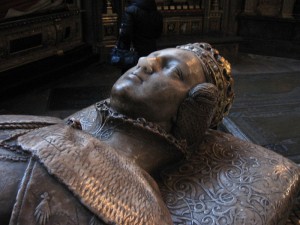 On 21st November 1559, Frances Grey (née Brandon), Duchess of Suffolk, eldest daughter of Charles Brandon, Duke of Suffolk, and his third wife Mary Tudor, Queen of France, and mother of the ill-fated queen Lady Jane Grey, died at Richmond. She was laid to rest in St Edmund’s Chapel, Westminster Abbey.
On 21st November 1559, Frances Grey (née Brandon), Duchess of Suffolk, eldest daughter of Charles Brandon, Duke of Suffolk, and his third wife Mary Tudor, Queen of France, and mother of the ill-fated queen Lady Jane Grey, died at Richmond. She was laid to rest in St Edmund’s Chapel, Westminster Abbey.
You can read more about Frances in my article Frances Brandon, Duchess of Suffolk.
Frances has gone down in history as a very domineering figure who abused her eldest daughter, Lady Jane Grey, and forced her to take the crown, but is this true? Well, historians and authors like Leanda de Lisle and Susan Higginbotham have challenged this view and you can click here to read an excellent article by Susan and I’d also highly recommend Leanda de Lisle’s book on the Grey sister: The Sisters Who Would be Queen.